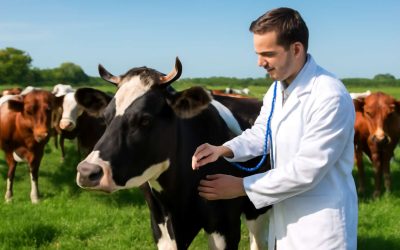
Veterinarians are medical professionals specializing in diagnosing, treating and preventing animal illnesses. Additionally, veterinarians help ensure a safe food supply by inspecting meat, poultry and dairy products before inspection by food authorities. Furthermore, those focusing on research make significant contributions to human health as well. Veterinarians can be found working at government agencies, hospitals or private practices.
Veterinarians spend most of their time providing clinical services to pets, farm, and wild animal patients, including performing surgery, administering medications and giving vaccinations. They also educate pet owners about keeping their animals healthy while traveling to remote locations to consult with ranches, dairies, zoos or other facilities.
Many veterinarians derive their job satisfaction from treating sick and injured animals and providing education for pet owners. Others might enjoy the intellectual challenge of solving disease mysteries and finding new treatments for various animal ailments. A lesser proportion may go into administrative careers within government agencies, universities or industry and commerce.
In order to qualify for veterinary school, excellent grades in science subjects such as biology and chemistry as well as high test scores on either the SAT or GRE exams may be required. Other requirements might include animal handling experience gained by volunteering at shelters or working for professional veterinarians as well as 4-H or FFA programs. Furthermore, you will require strong leadership and organizational abilities as being a veterinarian requires managing employees as well as business affairs outside treating animals.
Veterinary schools each have specific prerequisite requirements, so it’s wise to research those of interest to you to ascertain which courses you will need to complete as an undergraduate student. You can compare colleges by specialty, cost and board exam pass rate comparison; some offer international programs, externships or mentorship opportunities available exclusively to their students.
Once you’ve earned your veterinary degree, the next step should be applying for a license in your state of practice. Requirements vary, so check with local or state veterinary associations for specific regulations.
As a practicing veterinarian, you have many career options open to you – small animal medicine and surgery, diagnostics, emergency and critical care, or one of several other specialty areas. Many vets are also involved with public service activities, including wildlife conservation efforts and countering bioterrorism threats by helping control the spread of animal diseases to humans. Research veterinarians employed by universities and government agencies are finding innovative solutions to diagnose, treat and prevent both animal and human illnesses. These scientists have made major strides toward malaria and yellow fever prevention, botulism detection, permanent artificial limb development and have even identified ways to treat cancer and HIV in humans. Research scientists have also produced and improved upon vaccines, treatments for joint issues and broken bones, methods to avoid blood poisoning in those living with hemophilia, new surgical techniques and procedures, such as laser eye injury treatment – all contributing to an enhanced quality of life for both pets and people alike. These discoveries have contributed significantly to improved quality of life for both parties involved.



0 Comments